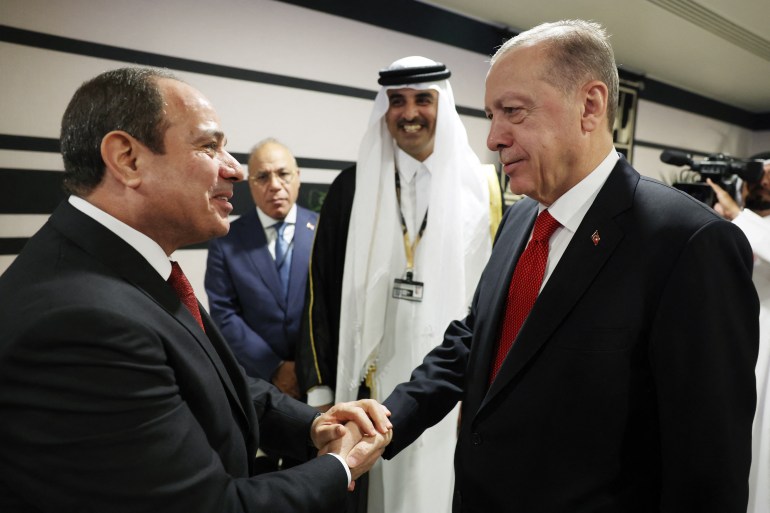A look at two decades of ties as Egypt, Turkey move to end rift | Politics News
How did Turkish-Egyptian relations get so bad, and why are they now moving to restore their respective ambassadors?
Egyptian Foreign Minister Sameh Shoukry has met his Turkish counterpart Mevlut Cavusoglu in Ankara, as the two countries make progress towards re-establishing full diplomatic relations after nearly a decade.
Thursday’s visit is Shoukry’s second trip to Turkey this year, while Cavusoglu also visited Egypt in March.
Speaking at a joint news conference, Cavusoglu said that the two countries were “taking concrete steps to raise diplomatic relations to the highest level”, indicating that the appointment of ambassadors may come soon.
But Shoukry did call on Turkey to withdraw its forces from Syria, underscoring some of the differences that still remain.
Relations between the two countries had soured following the overthrow of former Egyptian President Mohamed Morsi in a coup in 2013.
Here’s a timeline of relations between the two over the last 20 years:
2005: The two countries sign a free trade agreement, as economic ties between the two countries strengthened.
2011: As anti-government protests ramp up in Egypt, Turkish leader Recep Tayyip Erdogan tells Egyptian President Hosni Mubarak to “listen to the people”, days before he is overthrown in the Egyptian revolution in February. Erdogan travels to Egypt in September as part of a tour of countries affected by the Arab Spring.
2012: Ties strengthen after a member of the Muslim Brotherhood, Mohamed Morsi, becomes Egypt’s first democratically elected president. Erdogan’s AK Party and the Muslim Brotherhood are seen as having some ideological similarities, and Erdogan again visits Egypt, this time signing a loan agreement with the North African country that cements the positive relations between the two states.
2013: Morsi’s overthrow in a military coup leads to a dramatic shift in relations. Diplomatic ties are reduced to charge d’affaires level as Erdogan calls the leader of the “unacceptable coup”, and future president of Egypt, Abdel-Fattah el-Sisi, an “illegitimate tyrant”. In November, Cairo declares Turkey’s ambassador “persona non grata”. Turkey gradually becomes a hub for Egyptian exiles, including senior Muslim Brotherhood leaders, and opposition media outlets, while Erdogan adopts a hand gesture made popular at anti-coup protests in Egypt.
In the coming years, the two countries are also at odds over Libya, where they back opposing factions in an unresolved conflict, and also over maritime borders in the gas-rich Eastern Mediterranean.
2020: Egypt, along with Greece, is at odds with Turkey in a tense maritime boundary dispute in the Eastern Mediterranean about rights to search for and exploit natural gas deposits.
2021: Egypt and Turkey hold exploratory talks in May and September to discuss the restoration of bilateral relations, as regional alliances shift following an end to the Gulf crisis between Turkey’s ally Qatar on one side, and Saudi Arabia, the United Arab Emirates, Bahrain and Egypt on the other.

2022: El-Sisi and Erdogan meet and shake hands for the first time in Doha, Qatar during the opening of the World Cup.
2023: In February, Egypt’s Foreign Minister Sameh Shoukry pays a visit to Turkey in a show of solidarity after the devastating earthquakes that killed tens of thousands of people – marking the first visit of an Egyptian official to Turkey in a decade.
In March, Turkish Foreign Minister Mevlut Cavusoglu makes a one-day visit to Egypt amid continuing efforts to mend ties between Ankara and Cairo – the first senior Turkish official to visit Egypt in the last decade.

Pingback: Aviator
Pingback: Jerry
Pingback: เว็บตรง สล็อต บาคาร่า
Pingback: ดูหนังใหม่